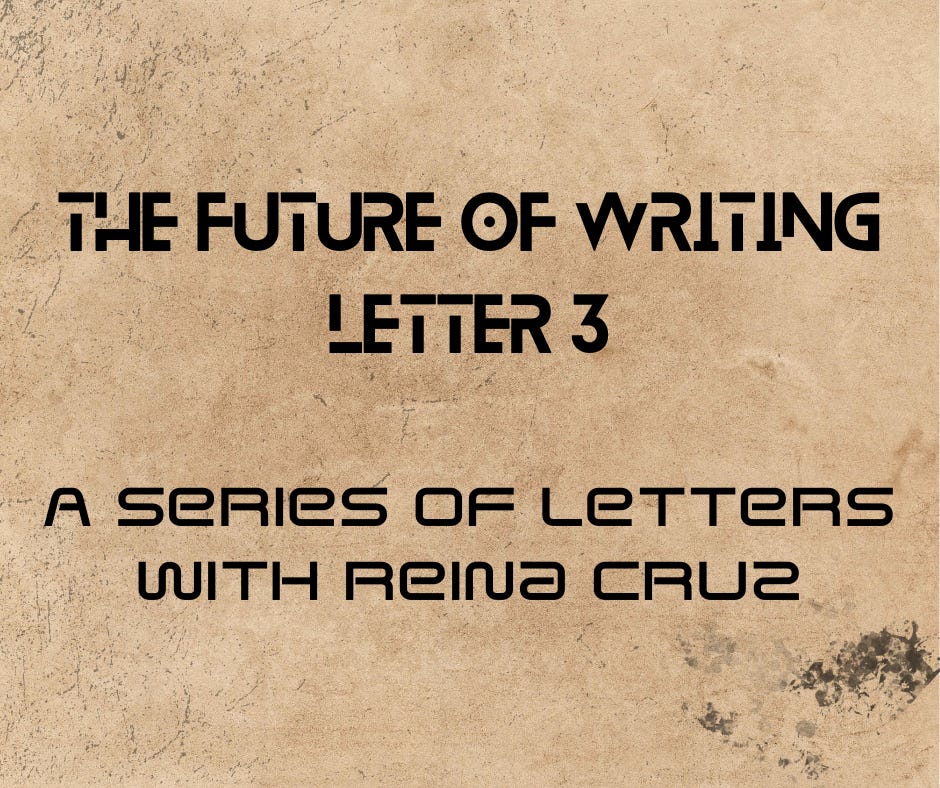This is part 3 in a series of letters between reinancruz and me, Zach Roush.
Realms is a sci-fi and fantasy newsletter and podcast taking you to new realms every month! I’ll be sharing my letters here on Realms while Reina will share hers on her Substack Indie Fiction Digest.
Here’s a bit about Reina: Reina Cruz is a writer and middle school teacher from California. She is the writer of the Daughter of Isis series and Marredbury. You can follow her on substack and on her website.
We’re talking about the “future of writing”, which also touches on other things like the future of creativity, how creatives stay creative, and how we do or not keep creating in the face of many obstacles, like AI and visual media.
Subscribe today to catch the whole series! We’ll add links here as we publish more letters.
Letter One: What Writers Need to do to Keep Writing Forever
Letter Two: What Will Readers be Reading?
Thank you for your insights and questions! You are very knowledgeable about the publishing industry for sure! And I loved learning about the 1000 fans concept. I can see how it’s a foundational philosophy for Substack and emergent publishing networks; a sort of idealistic twist on capitalism where “we can all lift each other up” and “there’s room for everyone.” I have hope that this philosophy can transform how publishing and consumption operate, as Substack is proof that things can change. I’ll get to your questions from your last letter in a roundabout way. Here they are, for clarity:
“Could the future of reading be interactive? Where does video game storytelling come in here? I have close to no experience with gaming storytelling. I would love to hear your thoughts on that.”
I have a story for you to illustrate my thoughts. This past week my family and I went to a VR escape room at Noobs VR. It was very cool. Our escape room was “Time Travel Paradox”; we had to solve puzzles by manipulating time. There was a narrative slapped on top of the escape room - and yes, it did feel more like a coat of paint than a story - where we had to stop an evil scientist from stealing a time machine. The evil scientist, whose name we all forgot and resulting in us screaming “stop, Dr. Huffenschmirtz!”, had no backstory or dialogue. He served to justify how we went back in time and also how the puzzles played out.
The thing is, with interactive narratives, the story doesn’t matter so much as how fun it is to play. The silly, thin narrative for “Time Travel Paradox” was more than enough to engage us in the interactive experience. I’m working on a game right now, developing the story and such, and there’s so much we don’t know because we don’t have a proof-of-concept for the gameplay itself. There’s a lot of trepidation as a result - we can’t commit to brass tacks until we know players will have fun. Interactive writing, whether it’s a choose-your-own adventure type experience, or a full-on video game, depends so much more on gameplay and interface than anything else. This means the writing has to be of the highest quality, to serve the player’s fantasy at all costs. And there’s not just one type of player out there, either. Everyone wants something different from their game of choice, which means designers and writers have to make room for all kinds of players. It’s a fun creative challenge - which actually ties in to other things I want to respond to from your letter.
One issue I have with the 1000 fans theory is simply how consumptive our media is today. It’s tough to compete with all the other things drawing on people’s attention spans. To highlight gaming, for example, there’s millions of free-to-play games out there, especially on Itch - an indie publishing site. In general, we have so much media at our fingertips - a vast, unending, growing ocean of it - and reading is so energy-intensive (compared to almost every other online media) that our work as writers tends to be at the bottom of the totem pole. Calling back to my first letter: We have to love the craft so much because if we don’t, we’ll always be caught in rejection. And, if you’ll let me be cynical for a moment, that ocean of media clawing for our audience’s attention is trending toward pure consumptive quality. There’s a term out there called “enshitification”, coined by Cory Doctorow, that describes how and why the internet and our entertainment are losing their quality. This article is my favorite on the subject. I bring this up to highlight what we, as slow, methodical creators who can’t simply ramp up our production and marketing processes to inhuman levels, are fighting against. Truly, it is a fight! It might seem bold to say, as there are still so many readers and writers, but the written word has become counter culture because of how pervasive consumptive media has become, i.e., TikToks, X’s (tweets?), you name it. This game I’m working on, similarly, can’t just be done because I want it to be.
The second issue I have deals with equity. As highlighted in your linked article, not everyone will be able to shell out even $5 a month for all of their favorite creators. Furthermore, the 1000 fans theory assumes that both creator and consumer have the means to both create and consume at-will, voluntarily. Even though our economy is designed to eternally grow, this doesn’t mean that creativity and the means to create grow in tandem with it. That’s the harsh reality that really eats away at my optimism. Substack is a wonderful democratizer, probably my favorite tool out there, but it’s its own ocean and we’re all competing for space here. And don’t get me wrong, it’s not a shark-eat-shark competition, as these letters attest, we writers are good at competing together in a weird sort of friendly harmony that lifts my spirits. Haruki Murakami in his book of essays, Novelist as a Vocation (an amazing read!), puts it like this:
“In short, the world of the novelist is like a professional wrestling ring that welcomes anyone who feels like taking a crack at it. The gap between the ropes is big enough to pass through, and a step is provided to make your entrance easier. The ring is spacious. No security men block your way, and the referee doesn’t bark at you to leave. The wrestlers who are already there–the established novelists, in other words–are at the very least resigned to your presence: “No worries–come on up and take your best shot” is their attitude. The ring is–how shall I put this?–an airy, easy, accommodating, altogether laid-back environment.
While entering the ring may be easy, however, remaining there for long is hard.”
As you said, rejection is part of the writer’s experience. Loving the craft is one solid way of dealing with it, and as you said, having practical goals is another. A third component I’d like to add is this: keep your eyes on your words. A little intentional blindness will go a long way to protect us from comparison, which is the thief of joy, and also that unique form of paralysis when gazing into the ocean of shitty content that’s everywhere. We’re not competing with the ocean - we’re competing with ourselves to write just one more word and find one more reader.
To sum it up, we have a lot to juggle with as creators, and concerning the future of writing, our relationship with our audience is paramount. We have a responsibility to them and ourselves to nurture the kind of world where, somehow, the 1000 fans theory can become a reality. So, with competition, enshitification, and equity in mind, how do you think we can craft a better world for creators? How can we be better consumers and help others be more mindful of their consumption? How do we affect this current culture positively? It goes without saying that reading, as opposed to other entertainment sources, is actually good for us. But we obviously can’t go screaming this at people and then shove our writing in their faces. I don’t want these to be the answers to my question: “be authentic to your audience” and “keep up the good work.” I want to find something new that feels true.
Looking forward to your thoughts!
Best, Zach
Do you have any thoughts, dear reader?
What do you think of our media landscape today?
Are you a creator, too? Share your story, fears, or responses!
Here’s my latest story, for your reading and listening pleasure:





